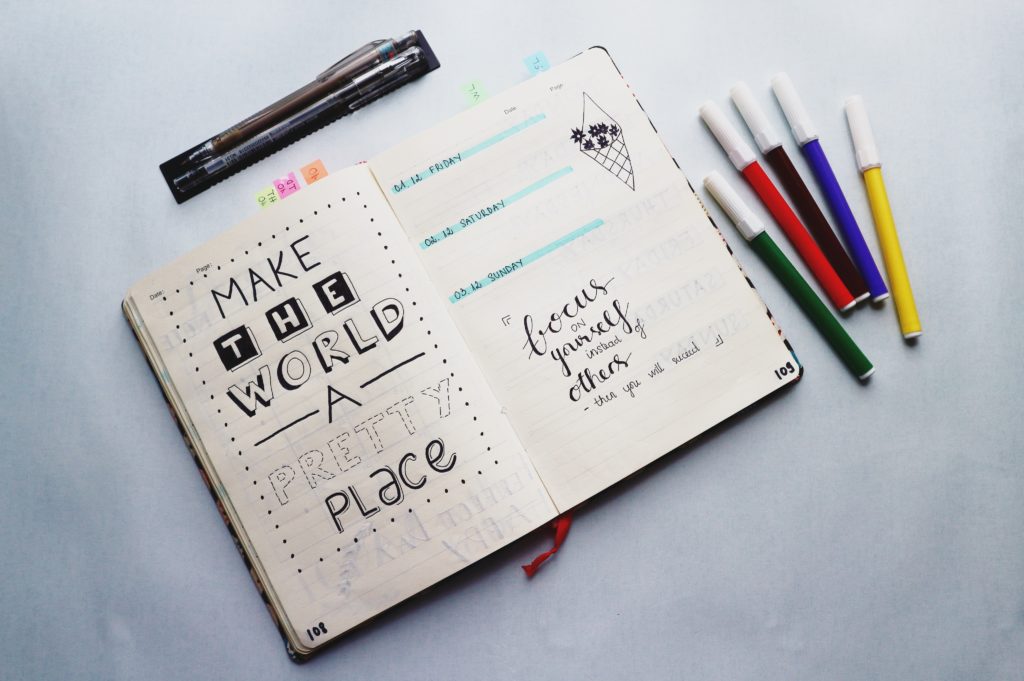Table of Contents
What Is Journaling?
Our thoughts and feelings are recorded in journals. Despite the fact that most journaling and finding new journaling ideas is a daily activity, there are virtually no guidelines. Keeping a journal is a method to document daily life. discovering our triggers for happiness and/or unhappiness. Your Journaling ideas can vary according to your day, situation or any event that occurred in your life. As vital as making meaningful ties with family or friends is making meaningful connections with oneself. This article will help you with ways to maintain a journal and journaling ideas.

Benefits Of Journaling
James Pennebaker, a psychologist and researcher at the University of Texas at Austin, claims that keeping a diary regularly improves immune function. Additionally, keeping a diary might help you better manage your emotions and enhance your brain and memory health if you suffer from stress, despair, or anxiety.
- Controlling anxiety
- Lowering tension
- Managing depression
- Your issues and fears can be prioritized by journaling.
- Keeping track of your issues regularly will help you identify their causes, increase your awareness of them, and find more efficient solutions.
- Keeping a journal might help you spot bad thoughts and actions.
- Improve your understanding of yourself by clarifying your ideas and feelings.
- Writing in a journal enables us to get new insight into our everyday experiences as well as a clearer understanding of our challenges.
You may monitor trends, growth, and changes over time by keeping a journal. You can see challenges you’ve been able to conquer by looking back at earlier entries. We may proceed more confidently when we are reminded of the resilience you demonstrated in past circumstances. Journaling and finding new Journaling Ideas is also refreshing for the mind.
How To Start Writing A Journal?
The same way we begin anything, by doing, is how we begin keeping a notebook. I enjoy using inspiration from various sources as a jumping off point. I frequently store some ideas on my phone or look for visual inspiration on Pinterest or Instagram. Have some of those materials on hand if you want to sketch or doodle or have any other Journaling ideas. We write because… To give words to our feelings and take a closer look at them in order to get past them. There are several methods to achieve it, but you’ll need a diary and some pens or pencils.
If you keep a notebook for around 20 minutes each day, it will be extremely beneficial. Use one of our starters, and then simply get started! My preferred method is to “brain dump,” which entails writing down anything I am considering at the time. I also like keeping a journal there on the nightstand. In this way, if I have trouble falling asleep, I may write down my ideas, which typically makes it much simpler to do so again. There are no rules, which is the most significant rule of all.

Set aside some time each day to write in your diary, and encourage yourself to do so. Try what works best for you; it can be great to exercise in the morning or right before bed. Make it easy. Keep a pen and diary nearby at all times so you may scribble down thoughts as they come to you. If doing it digitally works better for you, go for it! Here I have jotted down a few Journaling Ideas for you to get started with.
Journaling Ideas
Daily journaling is the ideal outlet for this since sometimes it’s enough to just let whatever wants to pour out of you on paper. But occasionally your mind becomes as empty as the page in front of you. It occurs. This is why it’s useful to keep a list of inspiring journaling topics close at hand.

Here are some journaling ideas:
Start by asking yourself, “What am I thinking?”
- Your driving forces.
- Your adversity and struggles
- You want to process your grief.
- A few things you regret.
- Your desires to live a better life.
- A list of your accomplishments.
- Make a list of your blessings.
- Thank you and inquiries of the spirit.
- Your goals.
- Your slumbers.
- Solving complex linkages.
- Both previous and future adventures.
- What you are happy with.
- A wish list.
- Aims in relationships.
- Family objectives
- Quotes- Add motivational, loving, or inspiring quotations. Every journaling idea page would benefit from having these.
- In five years, how do you want your life to be?
- What worries you?
- Describe a specific recollection in detail.
- Make a list of random acts of kindness.
- Write down any inquiries you have about life.
- The most significant life lessons you have encountered thus far.
- Write a letter to a stranger; you might find it simpler to express yourself to a fictitious stranger. This practise teaches you how to use conversational language.
- Send a letter to yourself from the past.
- Send a letter to yourself in the future.
- Write a letter of forgiveness (whether you send it or not, it is an activity to help you articulate the reasons you are pardoning someone or requesting forgiveness).
- Send your kids a letter they can read in the future.
- favourite places to go on vacation.
- What long-term objectives do you have for your life?
- Things about your partnership that you find positive.
- Your connections might use some enhancement in some areas.
- Best recollections of childhood.
- Favourite meals for comfort.
- Your perfect day.
- What brings you joy?
- What pastimes are you hoping to pick up?
- What qualities most define you?
- Do you have something to confess?
- Your preferred holiday or family customs.
- What moments in your life have brought you the most joy?
- Who would you like to be if you could be someone well-known or at the top in their profession?
- What would you develop or do if money was not an issue?
Final Thoughts:
I have been journaling for a while now and it had significant impact on my mood. It helps me to set my daily goals and stay positive. Journaling has improved the quality of my life & brought me joy in my life. It helps you build character & keeps you accountable. Things like gratitude journaling helps you appreciate life & live it to the fullest.
If you liked our article Try Evolve App to help you move on and focus on your growth. Evolve has a range of guided audios that help you proactively manage stress, reduce anxiety and make mindfulness light and joyful, so you can be balanced anytime! The Evolve app is now live globally on Android & Apple, click here to try it for free!
Co-founder and brains at LeapX by C32 Media Labs
Mail at sarah@c32.media to connect with her.